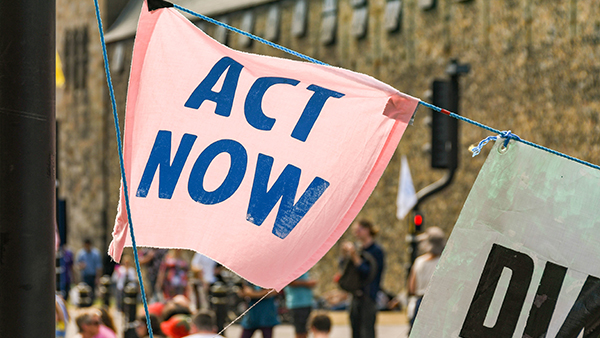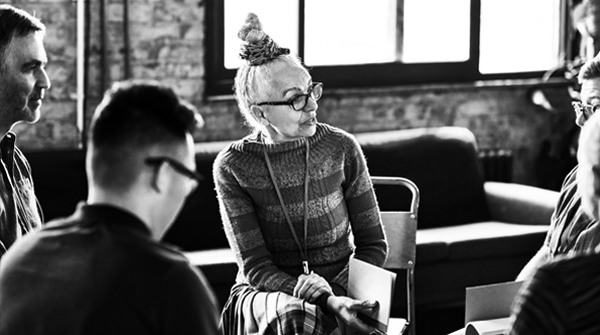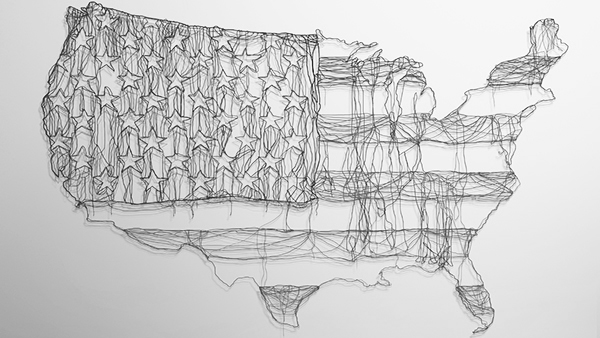In Saturday’s Guardian psychoanalyst and past RSA speaker, Darian Leader, writes:
‘The shopping addictions, sex addictions, internet addictions, and phone addictions that fill the diagnostic marketplace have become seen as addictions because they are apparently not under conscious control. But the real addiction that lies behind them is autonomy addiction: the illusion that we can ever truly be masters of ourselves’
The idea that society and its dominant norms more than individual sickness lie behind the increased prevalence of mental illness is not new but, still, it deserves more attention. Just as public health advocates talk about an ‘obesogenic’ culture, so we should be aware of the aspects of modern society that generate mental illness or lead us to pathologise attitudes or behaviours that might previously have been tolerated as merely eccentric or unfortunate. Wilkinson and Pickett and Michael Marmot are among those who have explored how elements of modern capitalist society, particularly inequality, lead to higher levels of anxiety and depression.
I have been examining this issue from a rather different angle. In my talks about coordination theory (based on the work of Mary Douglas and her followers) I describe the core ways in which we understand and approach the challenge of getting people to do things together.
It sounds basic, but my account is ambiguous about whether there are three or four modes of coordination. The problem being that while the first three – individualism (autonomy, competition, enterprise etc.), hierarchy (leadership, strategy, expertise etc.) and solidarity (values, belonging, fairness etc.) are all active forms of coordination the fourth, fatalism, is passive or merely oppositional.
The reasons people advocate each mode can be structural or individual. On the one hand, the assumptions, attitudes and actions of groups are shaped by the context in which people find themselves. Whatever our predispositions, we are likely to view the world individualistically in a shopping mall, solidaristically in a place of worship and hierarchically when we crave order. Some people may react against the prevailing mode, for example, expressing disdain for consumerism in a department store, nevertheless the context is shaping our response.
On the other hand, each of us has our biases. Some people tend to prefer one mode almost whatever situation in which they find themselves, something captured in phrases like ‘she’s a born leader’ or ‘he loves to be a rebel’. But even if we are less predictable, various largely random priming factors – how we happen to feel about ourselves that day, something we have read, heard or seen, how our friends are behaving – can predispose us to adopt a stance toward social action. Having done so we can quickly become identified with that stance.
So, for example, someone knocks at our door expressing concern about council plans to allow a supermarket chain to open a new store in our local shopping arcade. Do we decide at that moment to get involved and having done so end up being one of the campaign’s leaders; or perhaps we assume that the council knows what it’s doing, or feel that it’s pointless to oppose the decision, or maybe even think about the personal convenience provided by a local supermarket. Our reaction could reflect deeply held convictions about consumer capitalism or the local state, but it might equally be a response to something we just read or watched, or the culmination of a gradual feeling of guilt about opting out of community matters. How often we do say out loud ‘I don’t know why I ever got involved in this?’ and to ourselves ‘am I really so sure about the position I seem to have adopted?’
Fatalism too has both structural and individual determinants. I suggest that the former situations, when fatalism is a prevalent social norm, reflect cultures in which it seems impossible to combine the three active modes of coordination. For example, in Eastern Europe before the fall of the Berlin Wall, when solidarity was fake and individualism supressed, the culture was dominated by a deadening mixture of hierarchy and fatalism. Equally, in the investment banks before the credit crunch the absence of effective hierarchical control or solidaristic responsibility meant that no one felt able to tackle the enveloping madness of financialisation – rampant individualism was accompanied by a profound ethical fatalism.
But fatalism also has its individual side – a feeling that change is impossible or that even when it happens it won’t address the things that really matter. This is a voice we tend to feel we should ignore. All the modes of coordination offer useful insights and methods which can contribute to effective social action, but while modern society acknowledges the potential value of leadership, shared values and individual initiative, fatalism tends to be deprecated. Yet it can be soundly based.
A great deal of research shows that human beings have an in-built tendency to be too optimistic about their ability to achieve their stated goals. Indeed, since a ground breaking survey in the 1970s undertaken by Lyn Abramson and Lauren Alloy the phenomenon of depressive realism describes how people with low level depression are often more accurate in many of their predictions than those who report good mental health.
The deeper basis for fatalism concerns the human condition. To function it is necessary to see ourselves as unique, self-governing and virtuous even though we are members of a breed of animals largely propelled by our unthinking instincts and no more virtuous than the next member of the species. More bleakly still, we know we will die.
For many thinkers – amongst the most eloquent being Ernest Becker - it is the shadow of death and our deep need to deny it which propels us through life in a state of manic delusion. Modern Western culture doesn’t help. Offering hope about death has been religion’s USP. Christianity in particular making it both heroic and merely transitional. Religious iconography can be very fatalistic precisely because, having been promised immortality, believers are less daunted by death. In today’s irreligious times most of us lack even this comfort blanket. We live in a post-fatal culture.
Thus the first fatalistic presumption, that change tends not to achieve its goals, is often right while the second, that even when it does succeed it won’t change the hardest things about being human, is arguably always right.
In neither case is the conclusion I want to draw that we should succumb to pessimism. In relation to the chances of success, fatalism that encourages caution and scepticism in the face of blind optimism can be vital to making good decisions, while fatalism that fosters cynicism and apathy is not. In relation to the tragedy of being human, fatalism can encourage deep insight and detachment but we must somehow resist the siren call of despair.
Just like individualism, hierarchy and solidarity, we need to understand what fatalism has to offer as well as the malign consequences of it becoming dominant. Yet, as I’ve said, in societies like ours to express scepticism or a deeper realism about our human condition can be portrayed as damaging to common endeavour, self-indulgent or, worst of all, as a sign of personal pathology. Those who admit to fatalism can find themselves labelled and, as often happens with labels, internalise the characterisation coming to think that their own thoughts, indeed their minds, are unhealthy.
I am not for a moment suggesting that profound clinical depression is a socially constructed condition. But might the prevalence of the low level form, which leads hundreds of millions of people to see themselves as somehow inadequate or needing treatment, reflect our culture’s unwillingness to acknowledge fatalism as an accurate and useful way of seeing the world?
Related articles
-
The public are ready to go further and faster on net zero
Anthony Painter
The public are ahead of policy-makers and, indeed, most of the business world. COP26 is an enormous opportunity to catch up. Global leaders should take it.
-
Can progressives ever stop the in-fighting?
Matthew Taylor
Biden's victory has caused the left and moderates to fracture again.
-
Can President Biden bring America together again?
Anthony Painter
There is a long road ahead for the new president.




Join the discussion
Comments
Please login to post a comment or reply
Don't have an account? Click here to register.
What about family? Do we not have children in part so that we don't die, and is our children's future not a positive driver in our lives, or at least a hope that they might do better? Really interesting article, thank you.
1. 2. 3. An assumption that the three (orfour) modes of coordination are static classification ‘buckets’
I think that that there are better ways toframe the issues we face, using a more dynamic ecological/systems perspective.
Why described people as having ‘biases’rather than different ‘experiences’ and ‘perspectives’? From a groupperspective it is adaptive to have people arguing passionately for differentperspectives using the very best evidence they can muster. That way groups makebetter decisions. See Mercier and Sperber’s argumentative theory of reason: http://evolution.binghamton.edu/evos/wp-content/uploads/2011/06/Mercier-Sperber-Why-do-humans-reason.pdf
There is a great deal of evidence thatpositive thinking matters in situations where we can influence outcomes (i.e.ex ante). As Goethe put it, “To achieve all that he can, a man must think he ismore capable than he is.” We are not talking about delusions of grandeur but ahealthy level of confidence that brings all kinds of benefits – more friends,stronger social bonds etc. See Phil Rosenzweig’s book, Left Brain, Right Stuff.
The three modes of co-ordination youmention – individualism, hierarchy and solidarity – have a long history andcrop up all over the place, often used at different levels of analysis. McClelland (1961) talk about them at theindividual level when he described needs for achievement, affiliation, andpower. Economist Kenneth Boulding wrote about social organizers as‘ecodynamics’ and came up with the acronym TIE – threat, integration and exchange– he in turn got the idea from sociologist Pitirim Sorokin’s typology–compulsory, familistic and contractual.
The problem with most of theseclassifications is that they are static. What if these categories are notstatic ‘buckets’ but ecological phases? What if institutions are conceived inpassion and born in communities of trust? If they are to become successful andscale they must grow through the application of reason. But they mature inpower where they tend to get stuck, which leads to crisis and destruction butwith the possibility of renewal…. I develop this perceptive at length in mybooks, Crisis & Renewal (1995/2002) and The New Ecology of Leadership(2012). It brings optimism and hope to what otherwise would be fatalism anddespair.
The first part pf this blog should have read:
There seem to be three related assumptions in your blog:
1. A positivist (?) view that there is a reality out there that we can know and against which different views can be described as more or less 'realistic' or 'accurate'
2. The embrace of a 'glass half-empty' view of our cognitive powers, with us having 'biases' i.e. deviations from some ultimate, universal rationality
3. An assumption that the three (or four) modes etc....
Thanks Nick, Margaret and Jonathan. I continue to ponder these questions. It may be an obvious point but if you identify the three hardest, most intractable things about being human as i) the way we are continuously reminded of our animal nature, our unbidden and sometimes uncontrollable instincts ii) the fickle and often appalling nature of fate and iii) mortality and the knowledge the world will go on without us - then you see how religion's appeal lies in its offer to answer all three questions through moral codes, the idea of meaning in the universe and ultimate redemption. You also see how weak so far humanism has been in offering similar comfort but also how science and technology increasingly holds up the (illusionary?) prospect of providing its own answers.
I wonder where fatalism sits in relation to accepting change as a constant? If low level depression sometimes consists of realism about the fact that things we regard as concrete, and want to hang onto, will be swept away - then there are a number of possible outcomes. We accept change (1-0 to realism) and so we suffer less in the face of that truth. We fail to accept change (?) and so the other realism compounds, repeats and extends our suffering. Or we see that change has the potential to bring as many positive possibilities as negatives... we start to 'go with it'.
When we start to do that on an individual level we might (ok, my personal experience) become more aware of how many things around us are socially set up as 'things to grasp onto' and which we had previously taken as givens.
Two fleeting conclusions from this.
first - we socially create these concrete certainties [ideas, institutions...] in order to give us something to orientate on, some common objects to be social about, ways of being a shared 'us'. But they are doomed, if only by thermodynamics in the long run, so we sow the seeds of realistic fatalism together.
That makes fatalism look like clear eyed opting out of a mutual conspiracy.
Second thought is that a degree of depression, thus induced, may prompt us to take steps which open us up to the acceptance of change. Initially a therapeutic intervention, this suggests that depression may indeed be one of a number of routes to greater insight and wisdom.
Back in the early Nineties, I was collecting signatures for an EU referendum and most people were happy to sign, but nearly all of them said you're wasting your time, you can't buck authority. They said it with absolute conviction. So is fatalism selective? Can it affect certain areas of a person's life, usually concerning authority? Or do most people focus on areas they can control and act fatalistically towards the rest. When you go to meetings trying to get things done that are difficult, the organisers will usually say as a joke, I see the usual suspects are here. The last paragraph is very interesting. Perhaps you can wear fatalism like a suit of armour against the slings and arrows of life.